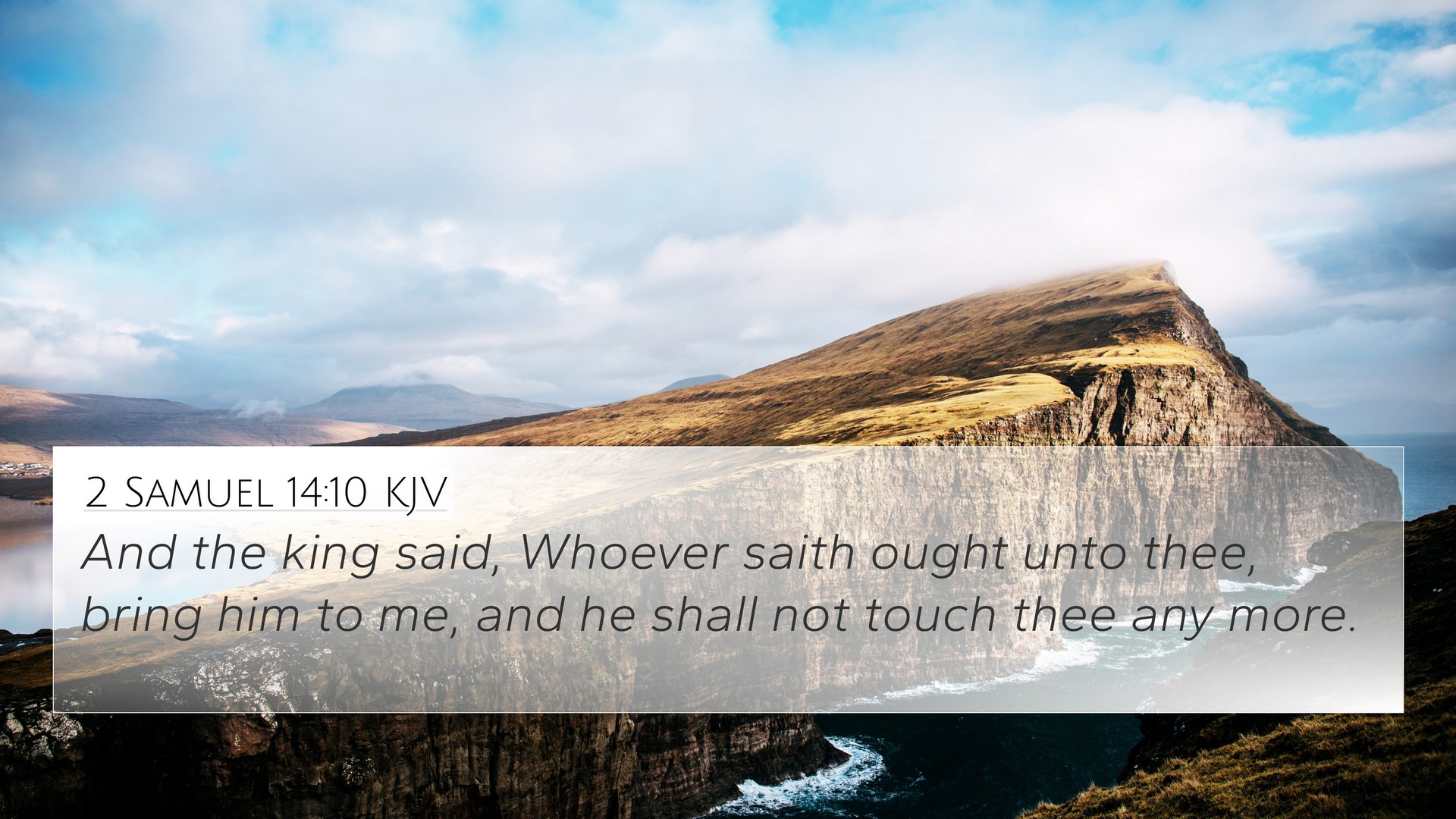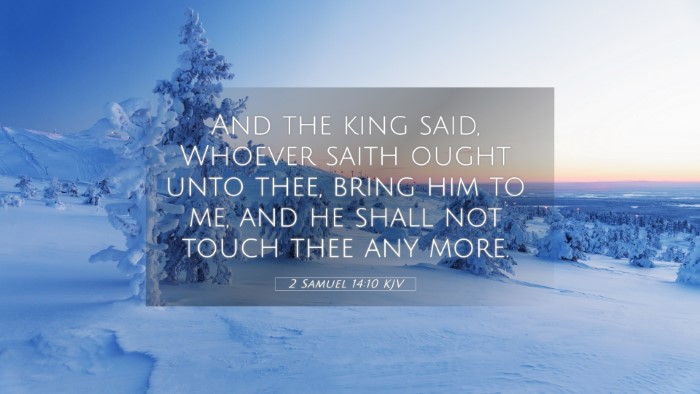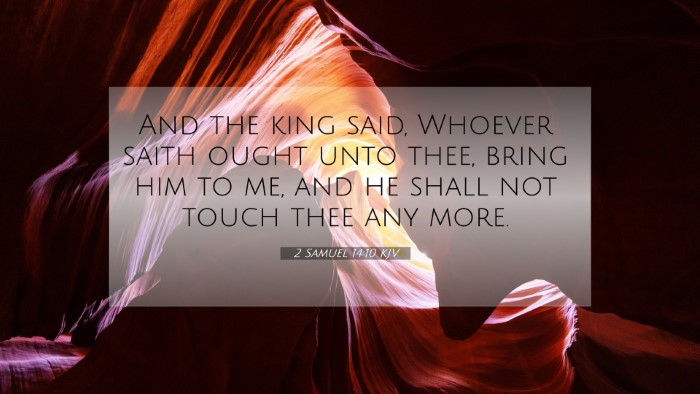Understanding 2 Samuel 14:10
2 Samuel 14:10 states, "And the king said, 'If anyone says anything to you, bring him to me, and he shall not touch you anymore.'" This verse occurs in the context of a conversation between King David and a woman from Tekoah, who was sent to plead for her son. The verse is a powerful illustration of David's authority and willingness to protect the innocent.
Commentary Insights
The insights from renowned commentators including Matthew Henry, Albert Barnes, and Adam Clarke provide a deeper understanding of this verse.
- Matthew Henry's Commentary:
Henry emphasizes David's role as a compassionate king who is willing to grant mercy and protect those who have been wronged. He highlights the king's readiness to hear grievances, reflecting his judicial responsibility. David's declaration serves as a metaphor for divine protection, illustrating how God preserves His people from harm.
- Albert Barnes' Notes:
Barnes points out the implications of this dialogue between the woman and the king. The verse underscores the notion of justice and the authority of the king. By inviting anyone who speaks against the woman to come forth, David ensures that truth prevails and that the innocent remain safe. This reinforces the theme of divine justice and protection.
- Adam Clarke's Commentary:
Clarke elucidates that the king's response reflects his willingness to shield the vulnerable. He contextualizes this verse as part of a larger narrative concerning family and duty. The invitation for anyone to speak indicates David’s desire for transparency and the upholding of justice, suggesting a system where the innocent can seek refuge under the king's protection.
Thematic Connections
This verse can be linked thematically to various other scriptures that address justice, authority, and protection. Below are some relevant cross-references:
- Psalm 9:9: "The Lord is a refuge for the oppressed, a stronghold in times of trouble." - This verse connects with the theme of seeking sanctuary in authority.
- Proverbs 18:10: "The name of the Lord is a fortified tower; the righteous run to it and are safe." - Emphasizing divine protection parallels King David's role.
- Romans 13:1: "Let everyone be subject to the governing authorities, for there is no authority except that which God has established." - This reflects the sovereign structure which David represents.
- Isaiah 32:1: "See, a king will reign in righteousness and rulers will rule with justice." - This verse foreshadows the just governance exhibited by David in 2 Samuel 14:10.
- Psalm 146:7: "He upholds the cause of the oppressed and gives food to the hungry." - Highlights God's advocacy for the wronged, akin to David's protection.
- Micah 6:8: "He has shown you, O mortal, what is good. And what does the Lord require of you? To act justly and to love mercy." - The narrative emphasizes justice and mercy, which are central to David's response.
- 1 Peter 2:14: "Or to governors, who are sent by him to punish those who do wrong and to commend those who do right." - A New Testament affirmation of earthly governance.
- Exodus 23:7: "Have nothing to do with a false charge and do not put an innocent or honest person to death, for I will not acquit the guilty." - Reflects the moral responsibility of authorities, resonating with David's promise.
- Jeremiah 22:3: "This is what the Lord says: Do what is just and right. Rescue from the hand of the oppressor the one who has been robbed." - Encourages just actions by leaders.
- Acts 4:19: "Peter and John replied, 'Which is right in God's eyes: to listen to you, or to him? You be the judges!'" - Reflects the theme of divine authority and the responsibility of human leaders.
Conclusion
2 Samuel 14:10 serves not only as an historical narrative but also as a theological reflection on justice, mercy, and the responsibilities of those in power. The insights derived from various commentaries and the thematic connections to other Biblical texts build a comprehensive framework to understand and interpret this verse more deeply.
Tools for Bible Cross-Referencing
For those seeking to delve deeper into cross-referencing Biblical texts, various tools and methodologies are beneficial, including:
- Bible concordance to identify related verses
- Bible cross-reference guide to navigate themes
- Cross-reference Bible study to explore interconnected teachings
- How to use Bible cross-references effectively for deeper study
- Bible cross-reference system for organized scripture comparisons
- Cross-referencing Bible study methods for collaborative learning
- Bible reference resources for comprehensive study materials
- Bible chain references for thematic exploration
- Comprehensive Bible cross-reference materials for thorough research
Final Thoughts
Understanding the depths of Scripture, as illustrated through verses like 2 Samuel 14:10, invites believers to develop a richer faith experience through rigorous study and exploration of cross-referenced themes. Engaging with these insights not only enhances personal understanding but also fosters community dialogue among believers regarding the authority and justice of God as displayed through His chosen leaders and their actions.


